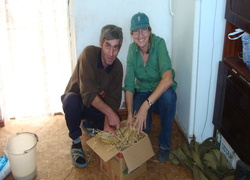http://www.bovinevetonline.com/directories.asp?pgID=755&ed_id=5222
Where in the world is….Karen Jacobsen, DVM
By Geni Wren | Monday, July 13, 2009
In October 2008, Karen Jacobsen, DVM, went on her second assignment to the Republic ofGeorgia through the Farmer-to-Farmer program*. Jacobsen, of Farm Animal Resources & Management (F.A.R.M.), LLC,Athens, Ga., took her first trip in 2007 for two weeks to assist a 100-cow dairy in Senaki,Georgia, a town near the Black Sea. Jacobsen says on her first visit she was struck by the lack of information available to the veterinarians in the country. Those educated during Soviet days had received an education that was seriously lacking in clinical information, especially regarding ruminants.
On her second trip, Jacobsen went to assist the same dairy with their nutritional program. The August 2008 war between Russian and Georgia was just over, and the Russian troops were still pulling out the week prior to her visit. She says she was concerned about security, but her translator friend assured her things were safe. On this visit, Jacobsen stayed in the dairyman's home. The homes still had only intermittent electricity, and no hot water for showers. Generators were used in the home and on the dairy when the power was out.
In an e-mail home on Oct. 23, 2008, Jacobsen wrote:
The town looks much the same as before except for the train station that Russia bombed and the houses on our block with no roofs from bomb damage. I haven't seen the town's civilian airport yet, which was also badly damaged. We are only 40 km from Abkhazia, one of the 2 regions that Russia now claims is no longer part of this country, but we have seen no Russians.
Today I spent my time designing a ration for dairy cows that presently get no minerals added to their feed! The owners previously bought a grain mix from a Turkish man, but when feed prices doubled, they opted to buy their own commodity feeds. He refused to sell them just a mineral premix, which he imports from Turkey. So now the cows are all mineral deficient, which is of course affecting their health and milk production. The dairyman’s brother is going toTurkey to try to buy the minerals on his own.
The farm grows and buys ear corn and they remove the kernels by hand. Labor is cheap here. Typical wages are $150/mo and 70% of the people are unemployed. Grain and fuel prices are 25 and 50% higher than in the U.S., and the farmers get $18/cwt for their milk.
The sad part is that everyone here will tell you that life was much, much better during communism. Even though they had less personal freedom back prior to 1991, there was 100% employment and their houses all had electricity, natural gas, and running water. This little country has been being punished by Russia for choosing democracy and capitalism!
The Lutalyse and Cystorelin donated by Pfizer and Merial were gratefully received by the dairy. They can buy neither here, as there is apparently not enough dairy infrastructure to warrant it yet.
This farm, with 100 milking cows is the largest in the country and the only one with milking machines. There are cows all over the roads in the villages, though, as most every family keeps a cow in the yard for milk and cheese-making.
Excerpts from a follow up e-mail on Oct. 27, 2008 from Jacobsen:
…The house had a well, but only cold water. Electricity was intermittent at both the dairy and the home, so we lucked into a hot shower mid week when the power was on at the dairy's cheese plant (they routinely milk with a generator during power outages).
On Thursday, Russia bombed a bridge from Abkhazia to the Samegrelo region, only 25 minutes from where the dairy is. We had planned to go to that area to look for a limestone source for the dairy feed, but the trip had to be cancelled.
The cow ration was also badly protein deficient (10.9%), as they stopped feeding soy due to cost. I suggested they get hazlenut waste, as there is nut production in Western Georgia. I also recommended they use the cheese whey in the ration, as it is rich in protein, and they were dumping it down the drain.
The country is still hugely pro-American and Pro-European. The people are still hopeful that they will get admitted to the EU and/or NATO. The dairy owner made a big deal about my visit, and even arranged a meeting with Senaki's mayor and city manager, in which they gave me a bouquet of roses.
When a car is going somewhere here it never travels with less than 4-5 people, even just across town. Gas costs $4.70/gallon and diesel is $8.00/gallon. Almost no-one has a car, and if they do, it becomes a taxi. There are lots of horses pulling carts on the roads (except in Tbilisiproper), but surprisingly few bicycles.
Tomorrow I meet with some Turkish mineral suppliers in Tbilisi, and will try to get to the government labs to donate the Brucellosis test kits I got donated from USDA. There is plenty of Brucellosis (and tuberculosis) here. People are generally aware of this and they know to boil their cow's milk before making cheese.
*The Farmer-to-Farmer program is funded by the United States Agency for International Development, and is administered through various non-governmental organizations. In 2007 and 2008, Dr Jacobsen travelled to the country of Georgia, via the Farmer-to-Farmer program administered by ACDI/VOCA. In 2010, Dr Jacobsen travelled to the country of Georgia, via the Farmer-to-Farmer program administered by CNFA.



